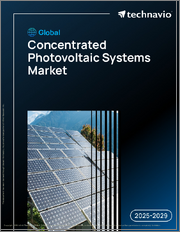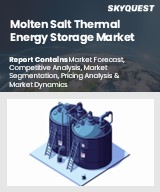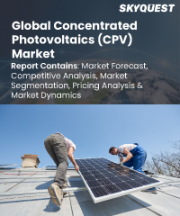
|
시장보고서
상품코드
1734788
태양광 발전(PV) 시장 예측(-2032년) : 컴포넌트별, 재료별, 그리드 유형별, 설치 유형별, 기술별, 용도별, 지역별 분석Photovoltaic Market Forecasts to 2032 - Global Analysis By Component, Material, Grid Type, Installation Type, Technology, Application and By Geography |
||||||
Stratistics MRC에 따르면 세계의 태양광 발전(PV) 시장은 2025년에 1,210억 5,000만 달러를 차지하고, 예측 기간 중 CAGR은 12%로, 2032년에는 2,676억 달러에 이를 전망입니다.
광기전력 효과를 나타내는 반도체 재료를 이용하여 태양광을 직접 전력으로 변환하는 공정은 광기전력으로 알려져 있습니다. 태양광의 광자가 이러한 물질에 흡수되면 전자가 여기되어 전류가 발생합니다. 태양광 발전 시스템은 일반적으로 여러 태양전지로 구성된 태양전지판, 인버터 및 기타 전기 부품을 사용합니다. 태양광 발전 기술은 환경에 거의 영향을 미치지 않는 깨끗하고 재생 가능한 에너지원으로 상업, 산업 및 주택에서 널리 채택됩니다. 지속가능한 발전을 통해 화석연료에 대한 의존도를 낮추고 기후 변화를 막는데 필수적입니다.
청정 에너지에 대한 수요 증가
태양에너지는 이산화탄소 배출을 줄이기 위해 세계 정부와 조직에 의해 크게 투자되고 있습니다. 기술 개발로 태양광 발전 시스템의 효율성과 가격이 향상되었습니다. 전기 요금을 줄이려는 소비자들 사이에서 옥상 태양전지판의 인기가 높아지고 있습니다. 보조금, 세제우대조치, 지원법은 모두 시장 도입을 증가시킵니다. 그 결과, 태양광 발전 시장은 상업, 산업 및 주택 분야에서 빠르게 성장하고 있습니다.
태양광 발전의 간헐성
태양광 발전은 날씨에 좌우되기 때문에 발전량이 낮거나 발전하지 않는 기간이 발생합니다. 또한, 태양광 발전의 전력은 다른 에너지원과 균형을 잡아야 하기 때문에 그리드 통합이 복잡해집니다.
시골전화 이니셔티브 확대
태양광 발전 시스템은 기존의 전력 인프라를 이용할 수 없는 농촌 지역의 사람들에게 저렴하고 지속 가능한 해결책을 제공합니다. 그 결과, 에너지에 대한 액세스가 개선됨으로써 지역 경제가 윤택해져, 태양광 발전 시스템 수요가 높아집니다.
다른 자연 에너지와의 경쟁
지역에 따라서는 풍력발전이 보다 확실하게 전력을 생산할 수 있기 때문에 태양광발전의 필요성이 낮아집니다. 투자자와 개발자는 보다 유리한 보조금이나 규제가 적용되면 특정 재생 가능 기술을 보다 매력적으로 느낄 수 있습니다.
COVID-19의 영향
COVID-19의 유행은 공급 체인 중단, 프로젝트 지연, 록다운 및 여행 제한으로 인한 노동력 부족 등을 일으켜 태양광 발전(PV) 시장을 혼란시켰습니다. 특히 PV 부품의 최대 생산국인 중국에서의 제조 감속은 세계 재료 부족으로 이어졌습니다. 주택용 PV는 일시적으로 떨어졌지만, 전력 사업용 PV는 급속히 회복했습니다.
예측기간 동안 태양광발전 패널 분야가 최대화될 전망
태양전지 패널 분야는 태양에너지 발전의 핵심 부품으로서 예측기간 중 최대 시장 점유율을 차지할 것으로 예측됩니다. 정부의 우대 조치나 지속가능성 목표는 주택, 상업, 산업 부문에 태양광 패널에 대한 투자를 촉진하고 있습니다.
예측기간 중 상업 및 산업(C&I) 분야가 가장 높은 CAGR이 예상됩니다.
예측기간 중 대규모 태양광 발전 설비의 확장성과 비용 효율로 상업 및 산업(C&I) 분야가 가장 높은 성장률을 보일 것으로 예측됩니다. 또한 이러한 기업의 지속가능성을 우선하는 경우가 많고, 재생 가능 에너지 목표 달성과 기업의 사회적 책임(CSR) 프로파일 향상에 도움이 되고 있습니다.
최대 점유율을 차지하는 지역:
예측 기간 동안 아시아태평양은 청정 에너지에 대한 수요 증가와 정부 인센티브로 최대 시장 점유율을 차지할 것으로 예측됩니다. 이 지역은 풍부한 일조량과 비용 효율적인 생산의 혜택을 받고 있으며, 태양광 발전은 에너지 전략의 중요한 요소가 되고 있습니다.
CAGR이 가장 높은 지역:
예측기간 동안 재생가능에너지 수요가 높은 북미지역이 가장 높은 CAGR을 나타낼 것으로 예측됩니다. 효율 개선이나 에너지 저장 솔루션 등 태양전지 기술의 진보가 시장 확대를 더욱 추진하고 있습니다. 또한 이 지역의 지속가능성과 청정에너지 정책에 대한 강한 관심은 주택, 상업시설, 공공시설 규모에서의 태양광 발전 시스템 수요를 계속 촉진할 것으로 예측됩니다.
무료 맞춤형 서비스
이 보고서를 구독하는 고객은 다음 무료 맞춤설정 옵션 중 하나를 사용할 수 있습니다.
- 기업 프로파일
- 추가 시장 기업의 종합적 프로파일링(3개사까지)
- 주요 기업의 SWOT 분석(3개사까지)
- 지역 세분화
- 고객의 관심에 응한 주요국 시장 추계, 예측, CAGR(주: 타당성 확인에 따름)
- 경쟁 벤치마킹
- 제품 포트폴리오, 지리적 존재, 전략적 제휴에 기반한 주요 기업 벤치마킹
목차
제1장 주요 요약
제2장 서문
- 개요
- 이해관계자
- 조사 범위
- 조사 방법
- 데이터 마이닝
- 데이터 분석
- 데이터 검증
- 조사 접근
- 조사 자료
- 1차 조사 자료
- 2차 조사 정보원
- 전제조건
제3장 시장 동향 분석
- 성장 촉진요인
- 억제요인
- 기회
- 위협
- 기술 분석
- 용도 분석
- 신흥 시장
- COVID-19의 영향
제4장 Porter's Five Forces 분석
- 공급기업의 협상력
- 구매자의 협상력
- 대체품의 위협
- 신규 참가업체의 위협
- 경쟁 기업간 경쟁 관계
제5장 세계의 태양광 발전(PV) 시장 : 컴포넌트별
- 태양광 발전 패널
- 인버터
- 장착 구조
- 추적 시스템
- 시스템 밸런스(BoS)
- 기타 컴포넌트
제6장 세계의 태양광 발전(PV) 시장 : 재료별
- 실리콘 베이스
- 실리콘 프리
제7장 세계의 태양광 발전(PV) 시장 : 그리드 유형별
- 온그리드
- 오프 그리드
제8장 세계의 태양광 발전(PV) 시장 : 설치 유형별
- 지상 설치형
- 건물 일체형 태양광 발전
- 수상 태양광 발전
- 기타 설치 유형
제9장 세계의 태양광 발전(PV) 시장 : 기술별
- 단결정 실리콘(모노실리콘)
- 다결정 실리콘(폴리실리콘)
- 페로브스카이트 태양전지
- 유기 태양전지(OPV)
- 집광형 태양광 발전(CPV)
- 기타 기술
제10장 세계의 태양광 발전(PV) 시장 : 용도별
- 주택
- 상업 및 공업(C&I)
- 유틸리티 스케일
- 군
- 농업
- 우주 기반
- 기타 용도
제11장 세계의 태양광 발전(PV) 시장 : 지역별
- 북미
- 미국
- 캐나다
- 멕시코
- 유럽
- 독일
- 영국
- 이탈리아
- 프랑스
- 스페인
- 기타 유럽
- 아시아태평양
- 일본
- 중국
- 인도
- 호주
- 뉴질랜드
- 한국
- 기타 아시아태평양
- 남미
- 아르헨티나
- 브라질
- 칠레
- 기타 남미
- 중동 및 아프리카
- 사우디아라비아
- 아랍에미리트(UAE)
- 카타르
- 남아프리카
- 기타 중동 및 아프리카
제12장 주요 발전
- 계약, 파트너십, 협업, 합작투자
- 인수와 합병
- 신제품 발매
- 사업 확대
- 기타 주요 전략
제13장 기업 프로파일링
- LONGi Green Energy Technology
- Tongwei Co., Ltd.
- JA Solar Technology Co., Ltd.
- JinkoSolar Holding Co., Ltd.
- Trina Solar Limited
- Canadian Solar Inc.
- First Solar, Inc.
- Risen Energy Co., Ltd.
- Hanwha Q CELLS
- REC Solar Holdings AS
- Adani Solar
- Seraphim Solar
- GCL System Integration
- SunPower Corporation
- Enphase Energy, Inc.
- Sungrow Power Supply Co., Ltd.
- Huawei Digital Power
- Sharp Corporation
According to Stratistics MRC, the Global Photovoltaic (PV) Market is accounted for $121.05 billion in 2025 and is expected to reach $267.60 billion by 2032 growing at a CAGR of 12% during the forecast period. The process of using semiconducting materials that exhibit the photovoltaic effect to directly convert sunlight into electricity is known as photovoltaic. When photons from sunlight are absorbed by these materials, electrons are excited and an electric current is produced. Solar panels made up of several solar cells, inverters, and other electrical components are commonly seen in photovoltaic systems. Photovoltaic technology is a clean, renewable energy source that has little effect on the environment and is widely employed in commercial, industrial, and residential settings. Through sustainable electricity generation, it is essential to lowering reliance on fossil fuels and halting climate change.
Market Dynamics:
Driver:
Rising demand for clean energy
Solar energy is being significantly invested in by governments and organisations around the world in an effort to lower carbon emissions. The efficiency and affordability of PV systems have increased due to technological developments. Rooftop solar panels are becoming more and more popular among consumers who want to reduce their electricity costs. Subsidies, tax breaks, and supportive laws all increase market adoption. Consequently, the market for photovoltaics is growing quickly in the commercial, industrial, and residential domains.
Restraint:
Intermittency of solar power
Periods of poor or no electricity output result from solar energy generation's reliance on weather. It is challenging to depend on solar energy for a steady power source because of this inconsistency. Large-scale energy storage devices are frequently needed to counteract this, which raises the cost. Additionally, because solar electricity must be balanced with other energy sources, grid integration becomes complicated. As a result, solar technology adoption is slower and expenses are higher.
Opportunity:
Expanding rural electrification initiatives
Solar photovoltaic systems provide rural populations without access to conventional power infrastructure with an affordable and sustainable answer. Such efforts are receiving more and more support from governments and international organisations in the form of grants, subsidies, and advantageous policies. This promotes the use of solar technologies in isolated areas and private investment. Local economies gain from better energy access as a result, which increases demand for PV systems. In the end, decentralised solar solution innovation and market expansion are fuelled by rural electricity.
Threat:
Competition from other renewables
In some areas, wind energy, for example, can produce electricity more reliably, which lowers the need for solar power. A dependable and proven source, hydropower frequently enjoys superior government incentives. Additionally, geothermal and bioenergy options offer scalability and reasonable cost. Investors and developers may find certain renewable technologies more appealing if they are subject to more advantageous subsidies or regulations. As a result of these rival renewable industries, the PV market will experience slower development and innovation.
Covid-19 Impact
The COVID-19 pandemic disrupted the photovoltaic (PV) market by causing supply chain interruptions, project delays, and labor shortages due to lockdowns and travel restrictions. Manufacturing slowdowns, particularly in China-the largest PV component producer-led to global material shortages. However, government stimulus packages and a renewed focus on green recovery strategies gradually revived demand. Residential installations saw a temporary dip, while utility-scale projects rebounded faster. Overall, the pandemic highlighted the need for resilient, localized solar supply chains and energy independence.
The photovoltaic panels segment is expected to be the largest during the forecast period
The photovoltaic panels segment is expected to account for the largest market share during the forecast period by serving as the core component for solar energy generation. Continuous technological advancements have improved panel efficiency, making solar power more cost-effective and widely adopted. Government incentives and sustainability goals are encouraging residential, commercial, and industrial sectors to invest in solar panels. The decreasing cost of raw materials and mass production also make photovoltaic panels more accessible. As demand for clean energy rises globally, the panel segment remains crucial to the market's rapid expansion.
The commercial & industrial (C&I) segment is expected to have the highest CAGR during the forecast period
Over the forecast period, the commercial & industrial (C&I) segment is predicted to witness the highest growth rate, due to scalability and cost-efficiency for large-scale solar installations. C&I businesses benefit from solar energy systems that help reduce operational costs by lowering electricity bills, contributing to long-term financial savings. Moreover, these businesses often prioritize sustainability, helping to meet renewable energy targets and enhance corporate social responsibility (CSR) profiles. The rise in energy prices and the push for energy independence further incentivize C&I players to adopt solar technologies. Additionally, government incentives and rebates tailored for the C&I sector make photovoltaic solutions more economically viable and attractive.
Region with largest share:
During the forecast period, the Asia Pacific region is expected to hold the largest market share due to the increasing demand for clean energy and government incentives. Countries like China, India, Japan, and South Korea are leading the market, with significant investments in solar energy infrastructure. The region benefits from abundant sunlight and cost-effective production, making solar power a key component of energy strategies. Technological advancements and falling solar panel prices are further fuelling adoption, positioning Asia Pacific as a global leader in PV energy production.
Region with highest CAGR:
Over the forecast period, the North America region is anticipated to exhibit the highest CAGR, owing to high demand for renewable energy. The U.S. and Canada are investing heavily in solar energy projects, with a focus on reducing carbon emissions and enhancing energy security. Advancements in solar technology, such as improved efficiency and energy storage solutions, are further boosting market expansion. Additionally, the region's strong focus on sustainability and clean energy policies is expected to continue driving demand for photovoltaic systems in residential, commercial, and utility-scale applications.
Key players in the market
Some of the key players profiled in the Photovoltaic Market include LONGi Green Energy Technology, Tongwei Co., Ltd., JA Solar Technology Co., Ltd., JinkoSolar Holding Co., Ltd., Trina Solar Limited, Canadian Solar Inc., First Solar, Inc., Risen Energy Co., Ltd., Hanwha Q CELLS, REC Solar Holdings AS, Adani Solar, Seraphim Solar, GCL System Integration, SunPower Corporation, Enphase Energy, Inc., Sungrow Power Supply Co., Ltd., Huawei Digital Power, Sharp Corporation.
Key Developments:
In August 2024, Tongwei announced plans to acquire a controlling stake in Runergy for approximately $698 million. This acquisition includes a 5 GW solar module plant in Huntsville, Alabama, positioning Tongwei to capitalize on U.S. manufacturing subsidies and expand its presence in the U.S. market.
In July 2024, LONGi and Invenergy established Illuminate USA, a joint venture to build a 5 GW solar module manufacturing plant in Ohio. This initiative leverages U.S. clean energy subsidies and aims to enhance LONGi's footprint in the North American market.
In November 2023, JA Solar entered into a strategic cooperation agreement with CJ Olivenetworks Vina, a subsidiary of South Korea's CJ OliveNetworks in Vietnam. This partnership aims to strengthen cooperation in the Vietnamese photovoltaic market and jointly promote its high-quality development.
Components Covered:
- Photovoltaic Panels
- Inverters
- Mounting Structures
- Tracking Systems
- Balance of System (BoS)
- Other Components
Materials Covered:
- Silicon-based
- Non-silicon
Grid Types Covered:
- On-grid
- Off-grid
Installation Types Covered:
- Ground-mounted
- Building-integrated Photovoltaics
- Floating Solar Photovoltaics
- Other Installation Types
Technologies Covered:
- Monocrystalline Silicon (Mono-Si)
- Polycrystalline Silicon (Poly-Si)
- Perovskite Solar Cells
- Organic Photovoltaics (OPV)
- Concentrated Photovoltaics (CPV)
- Other Technologies
Applications Covered:
- Residential
- Commercial & Industrial (C&I)
- Utility-scale
- Military
- Agricultural
- Space-based
- Other Applications
Regions Covered:
- North America
- US
- Canada
- Mexico
- Europe
- Germany
- UK
- Italy
- France
- Spain
- Rest of Europe
- Asia Pacific
- Japan
- China
- India
- Australia
- New Zealand
- South Korea
- Rest of Asia Pacific
- South America
- Argentina
- Brazil
- Chile
- Rest of South America
- Middle East & Africa
- Saudi Arabia
- UAE
- Qatar
- South Africa
- Rest of Middle East & Africa
What our report offers:
- Market share assessments for the regional and country-level segments
- Strategic recommendations for the new entrants
- Covers Market data for the years 2024, 2025, 2026, 2028, and 2032
- Market Trends (Drivers, Constraints, Opportunities, Threats, Challenges, Investment Opportunities, and recommendations)
- Strategic recommendations in key business segments based on the market estimations
- Competitive landscaping mapping the key common trends
- Company profiling with detailed strategies, financials, and recent developments
- Supply chain trends mapping the latest technological advancements
Free Customization Offerings:
All the customers of this report will be entitled to receive one of the following free customization options:
- Company Profiling
- Comprehensive profiling of additional market players (up to 3)
- SWOT Analysis of key players (up to 3)
- Regional Segmentation
- Market estimations, Forecasts and CAGR of any prominent country as per the client's interest (Note: Depends on feasibility check)
- Competitive Benchmarking
- Benchmarking of key players based on product portfolio, geographical presence, and strategic alliances
Table of Contents
1 Executive Summary
2 Preface
- 2.1 Abstract
- 2.2 Stake Holders
- 2.3 Research Scope
- 2.4 Research Methodology
- 2.4.1 Data Mining
- 2.4.2 Data Analysis
- 2.4.3 Data Validation
- 2.4.4 Research Approach
- 2.5 Research Sources
- 2.5.1 Primary Research Sources
- 2.5.2 Secondary Research Sources
- 2.5.3 Assumptions
3 Market Trend Analysis
- 3.1 Introduction
- 3.2 Drivers
- 3.3 Restraints
- 3.4 Opportunities
- 3.5 Threats
- 3.6 Technology Analysis
- 3.7 Application Analysis
- 3.8 Emerging Markets
- 3.9 Impact of Covid-19
4 Porters Five Force Analysis
- 4.1 Bargaining power of suppliers
- 4.2 Bargaining power of buyers
- 4.3 Threat of substitutes
- 4.4 Threat of new entrants
- 4.5 Competitive rivalry
5 Global Photovoltaic (PV) Market, By Component
- 5.1 Introduction
- 5.2 Photovoltaic Panels
- 5.3 Inverters
- 5.4 Mounting Structures
- 5.5 Tracking Systems
- 5.6 Balance of System (BoS)
- 5.7 Other Components
6 Global Photovoltaic (PV) Market, By Material
- 6.1 Introduction
- 6.2 Silicon-based
- 6.3 Non-silicon
7 Global Photovoltaic (PV) Market, By Grid Type
- 7.1 Introduction
- 7.2 On-grid
- 7.3 Off-grid
8 Global Photovoltaic (PV) Market, By Installation Type
- 8.1 Introduction
- 8.2 Ground-mounted
- 8.3 Building-integrated Photovoltaics
- 8.4 Floating Solar Photovoltaics
- 8.5 Other Installation Types
9 Global Photovoltaic (PV) Market, By Technology
- 9.1 Introduction
- 9.2 Monocrystalline Silicon (Mono-Si)
- 9.3 Polycrystalline Silicon (Poly-Si)
- 9.4 Perovskite Solar Cells
- 9.5 Organic Photovoltaics (OPV)
- 9.6 Concentrated Photovoltaics (CPV)
- 9.7 Other Technologies
10 Global Photovoltaic (PV) Market, By Application
- 10.1 Introduction
- 10.2 Residential
- 10.3 Commercial & Industrial (C&I)
- 10.4 Utility-scale
- 10.5 Military
- 10.6 Agricultural
- 10.7 Space-based
- 10.8 Other Applications
11 Global Photovoltaic (PV) Market, By Geography
- 11.1 Introduction
- 11.2 North America
- 11.2.1 US
- 11.2.2 Canada
- 11.2.3 Mexico
- 11.3 Europe
- 11.3.1 Germany
- 11.3.2 UK
- 11.3.3 Italy
- 11.3.4 France
- 11.3.5 Spain
- 11.3.6 Rest of Europe
- 11.4 Asia Pacific
- 11.4.1 Japan
- 11.4.2 China
- 11.4.3 India
- 11.4.4 Australia
- 11.4.5 New Zealand
- 11.4.6 South Korea
- 11.4.7 Rest of Asia Pacific
- 11.5 South America
- 11.5.1 Argentina
- 11.5.2 Brazil
- 11.5.3 Chile
- 11.5.4 Rest of South America
- 11.6 Middle East & Africa
- 11.6.1 Saudi Arabia
- 11.6.2 UAE
- 11.6.3 Qatar
- 11.6.4 South Africa
- 11.6.5 Rest of Middle East & Africa
12 Key Developments
- 12.1 Agreements, Partnerships, Collaborations and Joint Ventures
- 12.2 Acquisitions & Mergers
- 12.3 New Product Launch
- 12.4 Expansions
- 12.5 Other Key Strategies
13 Company Profiling
- 13.1 LONGi Green Energy Technology
- 13.2 Tongwei Co., Ltd.
- 13.3 JA Solar Technology Co., Ltd.
- 13.4 JinkoSolar Holding Co., Ltd.
- 13.5 Trina Solar Limited
- 13.6 Canadian Solar Inc.
- 13.7 First Solar, Inc.
- 13.8 Risen Energy Co., Ltd.
- 13.9 Hanwha Q CELLS
- 13.10 REC Solar Holdings AS
- 13.11 Adani Solar
- 13.12 Seraphim Solar
- 13.13 GCL System Integration
- 13.14 SunPower Corporation
- 13.15 Enphase Energy, Inc.
- 13.16 Sungrow Power Supply Co., Ltd.
- 13.17 Huawei Digital Power
- 13.18 Sharp Corporation



















